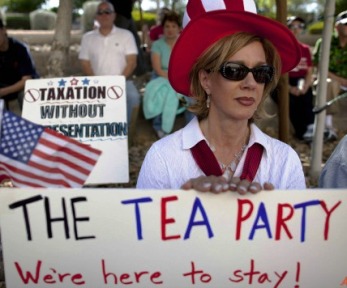After the Supreme Court’s decision on Citizen’s United allowed for nearly unlimited and unidentified donations to political campaigns in 2010, a number of new groups applied for tax-exempt status.

On February 16, 2012, Democratic Senators Al Franken, Chuck Schumer, Jeff Merkley and Michael Bennet wrote a letter to Douglas Shulman urging the then-IRS commissioner to investigate social welfare organizations “engaged in a substantial or even a predominant amount of campaign activity.”
In a March follow-up letter, the Senators took a stronger tone. “We urge the IRS to take … steps immediately to prevent abuse of the tax code by political groups focused on federal election activities. But if the IRS is unable to issue administrative guidance in this area then we plan to introduce legislation to accomplish these important changes.”
The letters never called for the IRS to target tea party or conservative groups.
According to the Minneapolis Star-Tribune (May 17, 2013), “During an appearance on CNN on Monday, Sen. Franken called for a ‘non-partisan’ inquiry into all 501(c)(4) groups.
A May 14, 2013 Inspector General’s Report determined that “The IRS used inappropriate criteria that identified for review Tea Party and other organizations applying for tax-exempt status based upon their names or policy positions instead of indications of potential political campaign intervention. Ineffective management: 1) allowed inappropriate criteria to be developed and stay in place for more than 18 months, 2) resulted in substantial delays in processing certain applications, and 3) allowed unnecessary information requests to be issued. Although the processing of some applications with potential significant political campaign intervention was started soon after receipt, no work was completed on the majority of these applications for 13 months…. Many organizations received requests for additional information from the IRS that included unnecessary, burdensome questions (e.g., lists of past and future donors).”
The IG concluded that the criteria used to target some conservative groups “gives the appearance that the IRS is not impartial in conducting its mission.” However, the IG did not find any connection to the White House or Obama administration.
Attorney General Eric Holder ordered the FBI to open a criminal investigation.
On May 15, Lois Lerner, the head of the IRS’s division on tax-exempt organizations testified before the House Oversight Committee chaired by Republican Darrell Issa. At that meeting, Lerner declared, “I have not broken any laws. I have not violated any IRS rules or regulations. And I have not provided false information to this or any other congressional committee.”
Lerner promptly invoked her Fifth Amendment right for any further testimony.
Issa shot back, stating that Lerner had given up that right when she made her statement, and noted criminal attorney and Harvard law professor Alan Dershowitz defended Issa’s position. “You can’t simply make statements about a subject and then plead the Fifth in response to questions about the very same subject,” Dershowitz said, “[once] you open the door to an area of inquiry, you have waived your Fifth Amendment right.”[
Thus began the vociferous pontifications from both Democrats and Republicans. Democratic Senator Claire McCaskill: “We should not only fire the head of the IRS which has occurred, but we’ve got to go down the line and find every single person who had anything to do with this and make sure that they are removed…”
Texas Senator John Cornyn released a video entitled “A Culture of Intimidation.”
An NBC News/Wall Street Journal poll (May 30-June 2, 2013), found that 55 percent of respondents believed that the controversy raises serious questions about the Obama administration’s honesty and integrity. 33 percent blamed President Obama directly.
Meanwhile, according to a Wall Street Journal story (Jan. 13, 2014) “The Federal Bureau of Investigation doesn’t plan to file criminal charges over the Internal Revenue Service’s heightened scrutiny of conservative groups, law-enforcement officials said, a move that likely will only intensify debate over the politically charged scandal.
“The officials said investigators didn’t find the kind of political bias or “enemy hunting” that would amount to a violation of criminal law. Instead, what emerged during the probe was evidence of a mismanaged bureaucracy enforcing rules about tax-exemption applications it didn’t understand, according to the law-enforcement officials.”
Sparked by a Treasury Inspector General’s report, the investigation “…concluded that IRS staff, particularly the Determinations Unit based in Cincinnati, used unfair criteria to select groups for scrutiny among those applying for tax-exempt status. The IRS said it was worried that politically active groups were improperly using a portion of the tax code traditionally reserved for nonprofits that weren’t primarily political organizations.
“Initially, an IRS employee in Cincinnati was asked to search for applications with certain terms in them or ones that had “political sounding” names. That led to the creation of a document called a ‘Be On the Look Out,” or BOLO, which prompted greater scrutiny of conservative groups. About a third of the groups had names that included ‘Tea Party,’ ‘Patriots’ or ‘9/12.’ Agents then directed questions about the group’s beliefs, donor lists and other information.”
Next up: the House Oversight Committee wants to know what happened to the missing e-mails of Lois Lerner.
Comments










